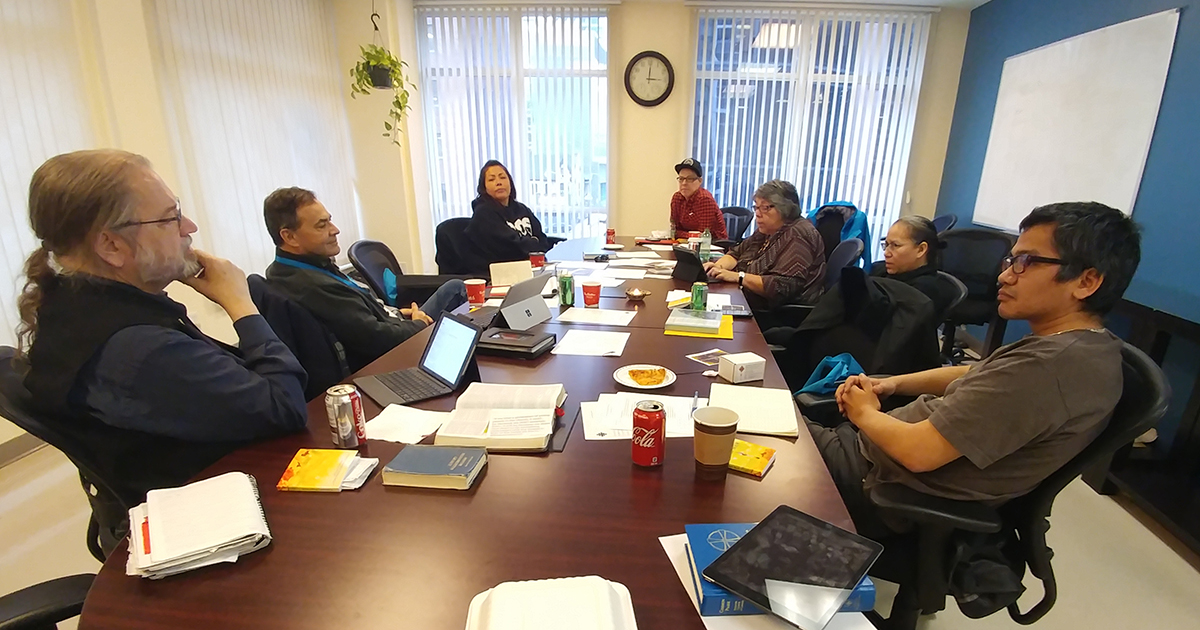Young Indigenous Anglican leaders gathered at Church House on Dec. 15-16 for an unprecedented meeting to discuss how they could work together to tackle the crises of suicide and opioid addiction gripping their communities.
The Toronto meeting brought together youth outreach workers Aaron Sault and Dixie Bird, as well as suicide prevention workers Yolanda Bird, Jeffery Stanley, and the Rev. Canon Norm Casey. National Indigenous Anglican Bishop Mark MacDonald and Indigenous Ministries coordinator Ginny Doctor were also in attendance.
Over the course of their two-day discussion, the young minds focused on the healing potential of programs such as gospel-based discipleship (GBD) and music camps, and shared their work experiences in order to see how they might better coordinate their efforts across Canada.
“I wanted to come here so that we could … have structure moving forward, so that we can progressively move forward in a positive way and and start seeing positive reflections of the work that the Indigenous Ministries office is doing, and of youth outreach workers,” said Sault, 35.
A resident of the Six Nations of the Grand River, Sault works together with Dixie Bird to engage youth in the community, supporting anyone who might need counselling or guidance.
Sault’s biggest concern at the meeting was discussing how to incorporate traditional teachings on culture and language into the churches. He believes that this can appeal to Indigenous youth who are searching for their own language, culture, and identity.
He noted that such teachings have been incorporated into GBD, in discussions at Sacred Circle, and at the Road to Warm Springs gathering in Pinawa.
“We have an opportunity here from our youth, our young people, that we can help out,” Sault said. “We can help them by teaching them and helping them with these cultural learning times, [such as] in language classes.”
Yolanda Bird, suicide prevention worker for Alberta, Saskatchewan, and Manitoba, was primarily concerned with touching base and figuring out ways to combat the epidemic of suicide in Indigenous communities.
The issue of suicide is a close one for Bird, who lost a brother to suicide 32 years ago, and has since spent much of her career focused on youth and mental health. She pointed to a notable rise in suicide rates in recent months, including in her home community of Montreal Lake Cree Nation.
“A lot of people in the north don’t really discuss the issue of suicide, so that’s why when it comes it’s such a shock,” said Bird, 39. “I think we need to find more ways to have safe talk [about these] issues with youth, and having a little more funding put into individual areas … to address these issues.”
At Montreal Lake, family violence conferences provide a forum where residents can address topics such as domestic violence and suicide. Raising awareness can teach young people how to recognize the signs of someone who may be suicidal and reach out to them.
Bird also highlighted the role of traditional languages in providing a greater sense of personal identity, which can greatly reduce the risk of suicide.
“For myself, I can understand the language, and hearing people that speak the language and talk about these issues, it has more substance,” Bird said. “And [as] we teach our children the language, I think they’ll understand more about their spirituality, and spirituality and religion are very much the same.”
Education in music and the arts can serve as a further underpinning for personal identity and self-esteem that can prevent suicide. At the meeting, Casey detailed the success of a music camp in Six Nations, where youth learn how to play musical instruments and sing songs in traditional languages such as Mohawk.
Despite its initial success, the music program still requires more “buy-in”, Doctor said. The community of Kingfisher Lake has expressed an interest in holding a similar music camp, but costs can be expensive—roughly $50,000 to cover expenses that include buying instruments. Indigenous Ministries is currently seeking funding for more music camps.
Other proposals discussed at the meeting include what Doctor described as a “mini-Sacred Circle for young people.” She has submitted a grant application for this initiative, and is finding community service projects, such as helping elders in need, which young people can participate in.
Thanks to this meeting, Doctor is looking at three or four main projects that Indigenous Ministries could concentrate on in 2019.
“It’s good to have our young voices present so we can listen to them, and get a good idea as to what they’re doing and what they think we can do,” she said.
“I’m finding a lot of energy here, and they’re actually giving me energy, because I’m beginning to think about things we can do, or that will have an impact and won’t cost us a lot of money to do. So that’s exciting for me—things that we can actually do ourselves.”
Interested in keeping up-to-date on news, opinion, events and resources from the Anglican Church of Canada? Sign up for our email alerts .

